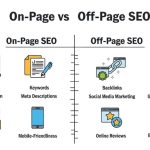
SEO is a high-growth, future-proof career blending technical skills, creativity, and data analysis. With hands-on practice, continuous learning, and strategic thinking, professionals can build profitable, flexible, and long-term careers across industries worldwide.
Search engine optimization has evolved from a niche marketing tactic to a fundamental business strategy. Companies across every industry now recognize that organic visibility directly impacts revenue, making SEO professionals increasingly valuable in the job market.
But breaking into SEO can feel overwhelming. The field combines technical skills with creative thinking, data analysis with content strategy, and constant learning with practical application. Whether you’re a recent graduate, career changer, or marketing professional looking to specialize, this guide will show you exactly how to build a thriving Successful SEO career.
Understanding the Successful SEO Career Landscape

What Does an SEO Professional Do?
SEO specialists optimize websites to rank higher in search engine results. This involves keyword research, content optimization, technical audits, link building, and performance analysis. However, the role varies significantly depending on company size and industry.
At startups, you might handle everything from technical SEO to content creation. Large enterprises often have specialized teams focusing on specific areas like technical optimization or content strategy. Agency environments offer exposure to multiple clients and industries, while in-house roles provide deep expertise in one business model.
Career Paths and Specializations
SEO offers diverse career paths, allowing professionals to specialize based on their strengths and interests. Some focus on technical SEO, optimizing site architecture, page speed, crawlability, and structured data. Others pursue content SEO, developing keyword strategies, optimizing on-page SEO, and aligning search intent with user needs. Local SEO specialists help businesses dominate location-based searches, while ecommerce SEO experts optimize large product catalogs for conversions. Advanced professionals often move into enterprise SEO, managing large-scale websites and cross-department strategies, or become SEO consultants, offering strategic guidance to multiple clients. This flexibility makes SEO a scalable, long-term career with multiple growth opportunities.
SEO offers multiple career trajectories:
- Technical SEO Specialist: Focus on website architecture, page speed, crawlability, and server optimization. This path suits those with programming backgrounds or strong analytical skills.
- Content SEO Strategist: Develop content strategies, perform keyword research, and optimize existing content. Perfect for writers and marketing professionals.
- Local SEO Expert: Specialize in helping businesses rank in local search results. High demand from small businesses and service providers.
- Enterprise SEO Manager: Lead SEO strategies for large organizations, manage teams, and coordinate with multiple departments.
- SEO Consultant: Work independently or for agencies, providing strategic guidance to various clients.
Building Your SEO Foundation
Essential Skills You Need
Technical Skills
- HTML/CSS basics for understanding webpage structure
- Google Analytics and Google Search Console proficiency
- Excel or Google Sheets for data analysis
- Basic understanding of JavaScript and how it affects SEO
- Familiarity with SEO tools like Screaming Frog, Ahrefs, or SEMrush
Analytical Skills
- Data interpretation and trend analysis
- A/B testing methodologies
- Conversion rate optimization principles
- Statistical analysis for measuring SEO impact
Communication Skills
- Writing compelling, optimized content
- Presenting data insights to stakeholders
- Collaborating with developers, designers, and content creators
- Client management (for agency roles)
Learning Resources and Certifications
Free Resources
- Google Search Central documentation provides official guidelines
- Moz’s Beginner’s Guide to SEO offers comprehensive fundamentals
- Search Engine Land delivers daily industry news and insights
- YouTube channels like “SEO by the Sea” provide advanced technical content
Paid Courses
- Moz Academy offers structured learning paths
- SEMrush Academy provides tool-specific training
- Coursera and Udemy feature comprehensive SEO courses
- Industry conferences like SMX and BrightonSEO offer networking and learning opportunities
Professional Certifications
While not required, certifications demonstrate commitment and knowledge:
- Google Analytics Individual Qualification (IQ)
- Google Ads certifications
- HubSpot Content Marketing certification
- Moz SEO Essentials certification
Gaining Practical Experience
Start With Your Own Projects
Launch a personal website or blog to practice SEO techniques. This provides hands-on experience with keyword research, content optimization, and technical implementation. Document your processes and results—this becomes portfolio material for job applications.
Choose a niche you’re passionate about. Whether it’s cooking, technology, or local history, genuine interest makes content creation easier and more authentic. Track your progress using Google Analytics and Search Console, noting which strategies work best.
Freelance and Volunteer Opportunities
Small businesses often need SEO help but lack budgets for agencies. Offer services to local restaurants, service providers, or nonprofits. This builds your portfolio while helping real businesses grow.
Freelance platforms like Upwork and Fiverr allow you to take on small projects. Start with basic audits or keyword research tasks. As you gain experience and positive reviews, you can increase rates and take on larger projects.
Internships and Entry-Level Positions
Many digital marketing agencies hire SEO interns or junior specialists. These roles provide mentorship and exposure to diverse client challenges. Even if the pay is modest initially, the experience and networking opportunities prove invaluable.
Look for positions titled “SEO Intern,” “Junior SEO Specialist,” “Digital Marketing Assistant,” or “Content Marketing Coordinator.” Many successful SEO professionals started in these roles and advanced quickly.
Building Your Professional Network

Join SEO Communities
Online Communities
- Reddit’s r/SEO community discusses trends and troubleshooting
- SEO-focused Facebook groups share insights and job opportunities
- Twitter SEO community provides real-time industry discussions
- Local digital marketing meetups offer face-to-face networking
Professional Organizations
- Search Engine Marketing Professional Organization (SEMPO)
- Local American Marketing Association chapters
- Women in SEO groups for networking and mentorship
- Industry-specific marketing associations
Attend Industry Events
Conferences provide learning opportunities and networking potential. Major events include:
- SMX (Search Marketing Expo) conferences
- MozCon for strategy and tactics
- BrightonSEO for technical insights
- Local SEO meetups and workshops
Many conferences offer student discounts or volunteer opportunities that reduce costs while providing access to industry leaders.
Advancing Your SEO Career
Specializing vs. Generalizing
Early in your career, gain broad experience across all SEO areas. This foundation helps you understand how different elements interconnect and identify your strengths and interests.
As you progress, consider specializing in high-demand areas:
- Technical SEO specialists command high salaries due to skill scarcity
- Local SEO experts serve the growing small business market
- E-commerce SEO specialists work with online retailers
- International SEO experts help companies expand globally
Developing Leadership Skills
Senior SEO roles require more than technical expertise. Develop skills in:
- Project management and team leadership
- Strategic planning and goal setting
- Budget management and resource allocation
- Cross-functional collaboration
- Client relationship management
Consider pursuing an MBA or leadership training programs to complement your SEO expertise.
Staying Current With Industry Changes
SEO evolves constantly. Google releases hundreds of algorithm updates annually, and new technologies like AI and voice search create new optimization opportunities.
Stay informed through:
- Industry publications and blogs
- Google’s official communications
- SEO tool updates and new features
- Experimental testing and case studies
- Continuing education and advanced certifications
Common Career Challenges and Solutions
Dealing With Algorithm Updates
Algorithm changes can dramatically impact website rankings and client results. Successful SEO professionals develop resilience and adaptability.
Build diverse skill sets so you’re not dependent on specific tactics. Focus on fundamental best practices like creating quality content and improving user experience. These strategies remain effective regardless of algorithm changes.
Managing Client Expectations
SEO results take time, but clients often expect immediate improvements. Develop clear communication skills to explain timelines and set realistic expectations.
Create regular reporting schedules that show progress beyond rankings. Include metrics like organic traffic growth, keyword improvements, and technical issue resolution. This demonstrates value even when rankings fluctuate.
Balancing Technical and Creative Work
SEO requires both analytical thinking and creative problem-solving. Some professionals struggle with this balance, feeling stronger in one area than the other.
Collaborate with specialists in your weaker areas. Partner with content creators if you’re technically focused, or work with developers if you’re content-oriented. This approach leverages everyone’s strengths while delivering comprehensive results.
SEO Career Salaries and Growth Potential
SEO salaries vary by location, specialization, and experience. Entry-level professionals can expect steady starting pay, while experienced specialists—especially in technical or enterprise SEO—command high salaries. Freelancers and consultants can scale income based on expertise and client base. As SEO directly impacts revenue, skilled professionals enjoy strong negotiation power and long-term earning potential.
How AI Is Changing SEO Careers
AI tools are reshaping keyword research, content optimization, and data analysis. Rather than replacing SEO professionals, AI enhances productivity. Future SEO careers will reward those who can guide AI tools strategically, interpret data critically, and maintain human-centered optimization. Understanding search intent, experience, and trust signals remains irreplaceable. SEO professionals who embrace AI gain a competitive edge.
Long-Term SEO Career Growth and Leadership Paths
With experience, SEO professionals can advance into roles like SEO Manager, Head of Growth, Digital Marketing Director, or independent consultant. Leadership roles require strategic vision, budgeting skills, and cross-team coordination. Some professionals transition into product management, analytics, or entrepreneurship. SEO provides a flexible foundation for long-term digital leadership.
Taking the Next Steps in Your SEO Journey
 Building a successful SEO career requires dedication, continuous learning, and practical application. Start by mastering fundamental concepts through free resources and hands-on practice. Build a portfolio with personal projects and volunteer work, then seek entry-level positions or internships.
Building a successful SEO career requires dedication, continuous learning, and practical application. Start by mastering fundamental concepts through free resources and hands-on practice. Build a portfolio with personal projects and volunteer work, then seek entry-level positions or internships.
Focus on developing both technical skills and business acumen. The most successful SEO professionals understand how organic search supports broader business objectives. They communicate effectively with stakeholders and adapt strategies based on measurable results.
The SEO field offers excellent growth potential, competitive salaries, and the satisfaction of helping businesses succeed online. Companies continue investing heavily in organic search, creating abundant opportunities for skilled professionals.
Begin your SEO journey today. Choose one learning resource, start a personal project, or apply for an entry-level position. The expertise you build now will serve you throughout a rewarding career in search engine optimization.
Conclusion
A career in SEO offers rare balance—technical challenge, creative strategy, measurable impact, and long-term stability. By mastering fundamentals, gaining hands-on experience, and continuously adapting to search evolution, professionals can build rewarding careers across industries. SEO rewards curiosity, patience, and strategic thinking more than shortcuts. Those who commit to learning and execution will find limitless growth opportunities.
Frequently Asked Questions (FAQs) – SEO Career
1. What qualifications do I need to start an SEO career?
You don’t need a formal degree to become an SEO professional. Employers value practical experience, problem-solving ability, and measurable results more than academic credentials. A strong understanding of search fundamentals, hands-on projects, and familiarity with tools like Google Analytics and Search Console are far more important.
2. Is SEO a good career for beginners?
Yes, SEO is highly beginner-friendly. Many professionals enter the field through internships, junior SEO roles, freelancing, or content marketing positions. With structured learning and practice, beginners can build job-ready skills without prior technical backgrounds.
3. How long does it take to learn SEO?
You can learn SEO basics in 3–6 months with consistent practice. Mastery takes longer, as SEO evolves continuously. Real-world experience, testing strategies, and adapting to algorithm updates are essential for long-term growth.
4. Is SEO a technical job?
SEO blends technical, analytical, and creative skills. While deep coding knowledge isn’t required, understanding site structure, page speed, crawlability, and basic HTML improves performance and career opportunities.
5. Can SEO be self-taught?
Absolutely. Many successful SEO professionals are self-taught using free resources, blogs, YouTube tutorials, case studies, and personal websites. Consistent experimentation and analysis accelerate learning faster than theory alone.
6. Are SEO jobs in demand?
Yes. As businesses rely more on organic traffic and digital visibility, demand for skilled SEO professionals continues to grow across startups, agencies, and enterprises worldwide.
7. What industries hire SEO professionals?
SEO experts are needed in ecommerce, SaaS, healthcare, finance, education, media, real estate, and local service industries. Any business with an online presence benefits from SEO.
8. Is SEO better than paid advertising careers?
SEO focuses on long-term growth and sustainable traffic, while paid advertising delivers immediate results. Both are valuable, but SEO offers stronger long-term stability and compounding returns.
9. Can I work remotely as an SEO professional?
Yes. SEO is one of the most remote-friendly digital careers, allowing professionals to work globally as freelancers, consultants, or full-time remote employees.
10. Does SEO require coding knowledge?
Basic HTML and technical understanding are helpful, but advanced programming is not mandatory. Collaboration with developers often fills technical gaps.
11. Can freelancers earn well in SEO?
Yes. Experienced SEO freelancers and consultants can earn high incomes by working with multiple clients, offering audits, strategy, and ongoing optimization services.
12. Is SEO future-proof as a career?
SEO is highly future-proof. While algorithms and tools evolve, search engines remain essential, and professionals who adapt to AI, UX, and data-driven strategies will stay in demand.


















No Comments